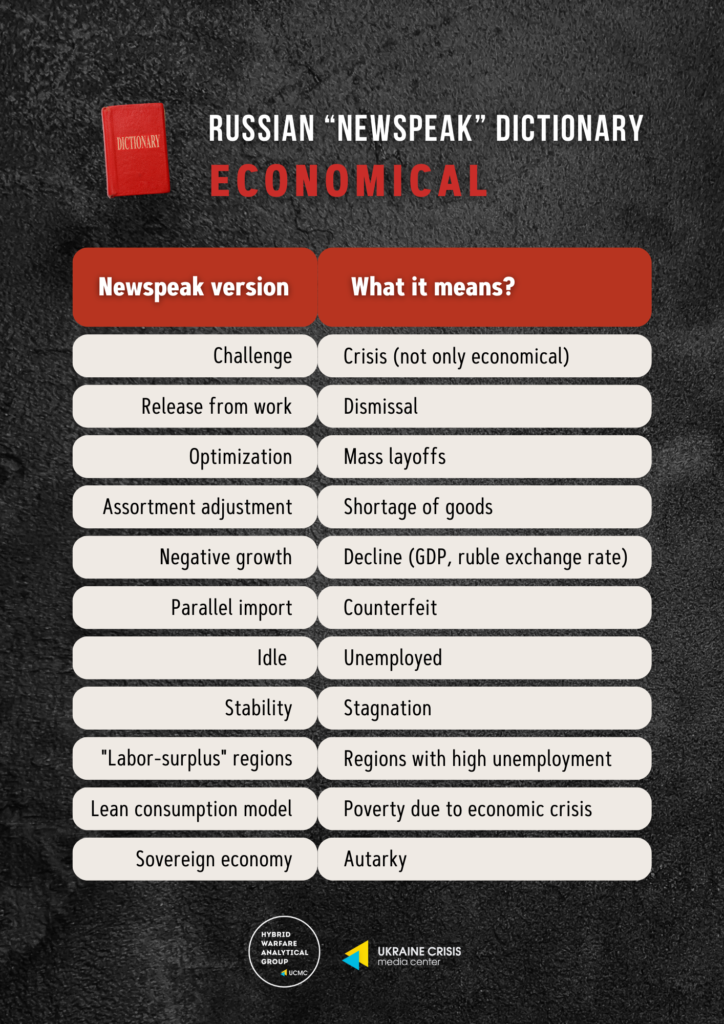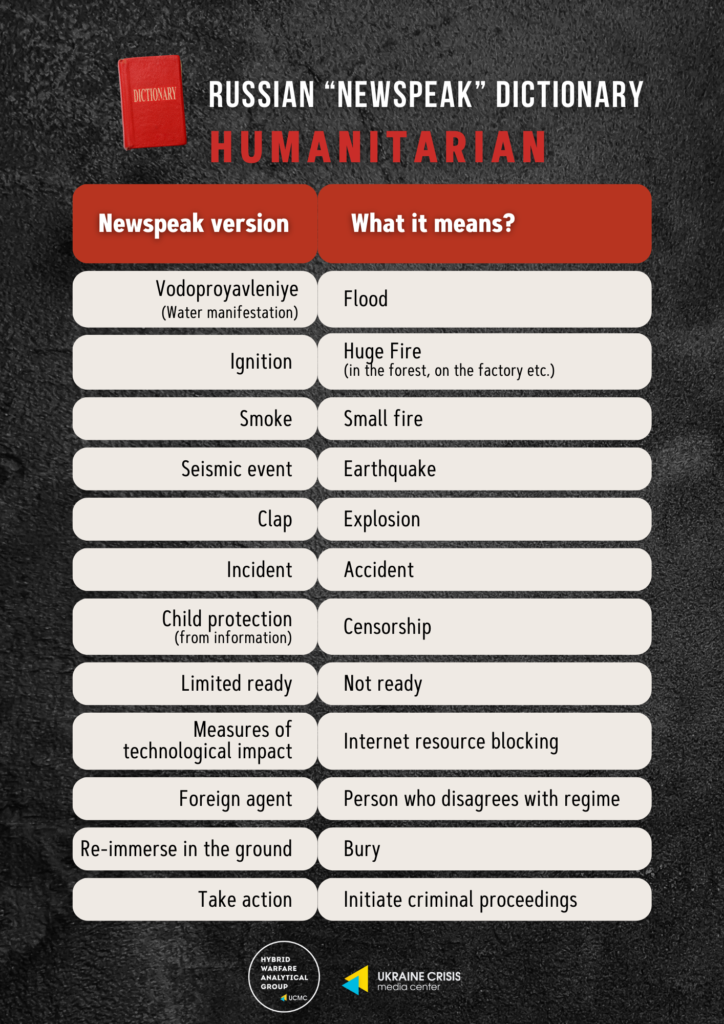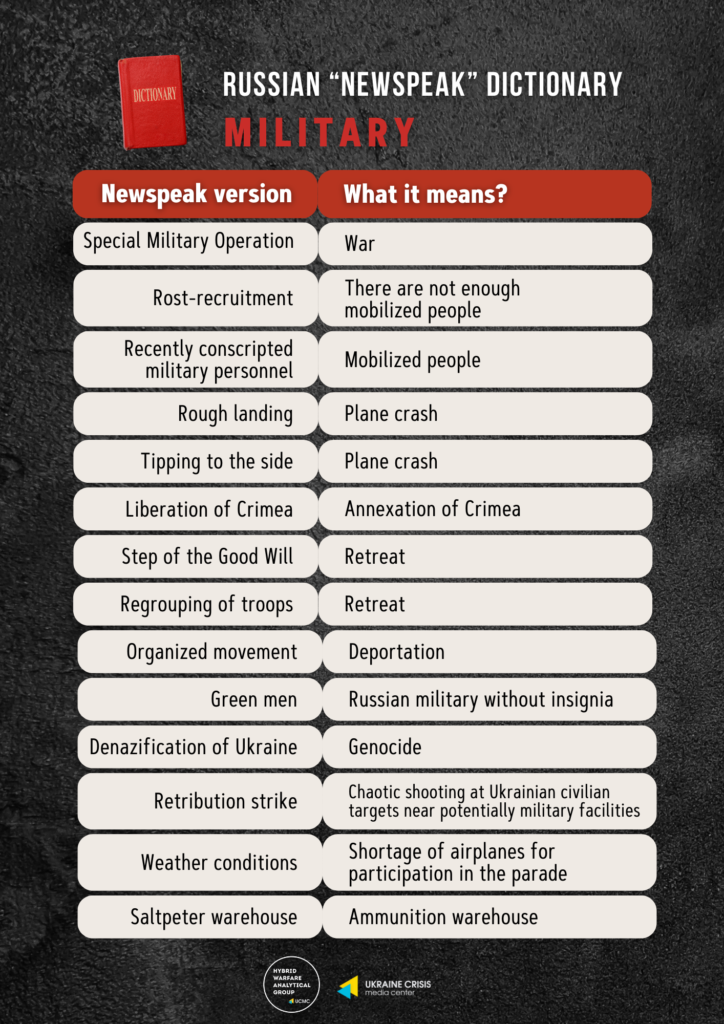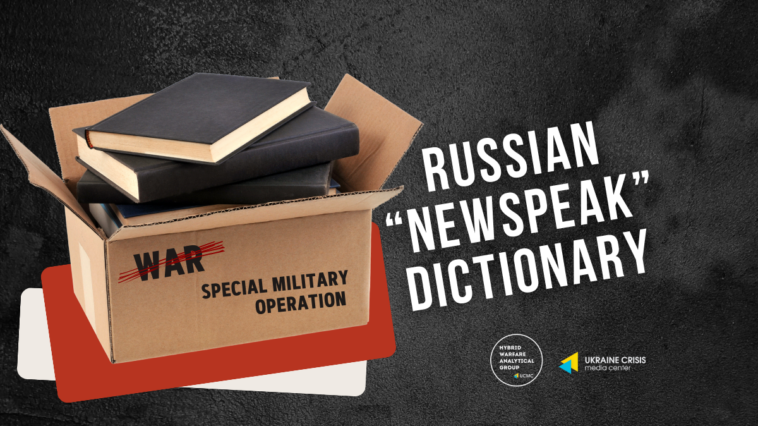The recent attack on the Kerch Bridge caused quite a stir in Russian society. For the Kremlin regime, the bridge is an essential symbol of Crimea’s indisputable belonging to the Russian Federation. Nevertheless, Russia is often unable to intercept all attacks on such symbolic objects, and when word about such an event spreads, the regime resorts to distorting the information through an impressive variety of clericalisms, euphemisms, and other types of specifically created jargon to reduce the political fall-out.
Using terms that allow propaganda to “soften” objective reality and change the emphasis of perception is not a new technique in the field of propaganda. This was also used in the Soviet Union, where in the 1930s, instead of the word “famine,” propaganda used, “food restrictions”; and in Nazi Germany, positive things were called “fanatic” (because it was considered great to be a Nazi fanatic).
In George Orwell’s dystopian novel “1984”, the approach manifested as one of the main tools of state propaganda: “From the place where Winston stood, it was straightforward to read, elegantly printed on his white surface, the three slogans of the Party: WAR IS PEACE – WILL IS SLAVERY – INDIFFERENCE IS STRENGTH.” This tactic was coined “Newspeak,” and it was intended to replace “Oldspeak” (regular English).
Such methods are intended to create a reality that will prevent the population from becoming traumatized as a result of an unexpected event. This allows the regime to create an image that it has the situation under complete control. Avoiding the use of words that accurately describe events became a typical marker of Russian State propaganda aimed at influencing the domestic audience.
In reality, Russian propaganda has been successfully using this tool for many years. Our research shows that, one of the first times modern Russia used this ‘weapon’ was on the reporting of the Kursk tragedy, the Russian Navy’s submarine which experienced significant technical problems, “Kursk” : “They were problems with the submarine, which meant the submarine had to go down to the ground.”
Russian “Newspeak” after full-scale invasion of Ukraine
This was not the first time The Kerch Bridge was attacked; during the first attack in October 2022, the regional media referred to it as an “incident” or “emergency.” It is also noteworthy that the most recent attack is described with almost identical messages.
“Sailing in the Kerch Strait was not blocked due to the incident on the Crimean Bridge,” The Russian Navy announced.
“The movement has been stopped on the Crimean bridge due to an emergency in the area of the 145th pillar from the side of the Krasnodar region,” declared the Gauleiter of the temporarily occupied Crimea, Sergey Aksyonov
The Kerch Bridge accident is an excellent example of the other side of Russian propaganda when they not only propagate something but how they keep silent about a specific event. First, the missile cruiser Moskva, which Ukraine destroyed in April 2022, is mentioned here. At first, Russian officials reported a fire due to ammunition having unexpectedly detonated, and later towed to Crimea, meaning all was safe. But actually, 500 members of the crew that were involved in the shelling of Ukraine are listed as missing, and this subject is no longer discussed due to censorship.
“As a result of a fire, ammunition detonated on the Moskva missile cruiser. The ship was seriously damaged,” the Defense Ministry said in a statement.
The Russian authorities actively use this technique in all possible aspects of public life. It is also worth noting that the Russian media avoids using Newspeak when discussing events in Europe or around the world. This was already noted by Maria Kalmykova in her study “A Study of the Influence of the War in Ukraine on the Russian Language”:
“A ‘clap’ occurred in a residential building in St. Petersburg”
“An explosion occurred in a residential building in Germany”
Next, we will provide additional examples of similar euphemisms and mirroring terms in Russian propaganda.
Economical

“The ruble floats at a given rate: what is happening to the Russian currency”
Humanitarian

“Dear passenger! On the station “Begovaya,” work is being carried out to eliminate water manifestation”
Military

“A loud clap similar to the sound of a medium-sized explosion was heard in the center of Belgorod.”
Since Newspeak is a widespread tool for specific censorship of the Russian mass media, it is essential to note that this technique has begun its reemergence. In particular, this is visible in various regional chats of the frontline territories. During the shelling, residents almost entirely exchange information in Newspeak jargon. Of course, this is also explained by the strict censorship of describing Russian army activities and the difficulty of remaining anonymous in Russia, even on the Internet.
What does this mean for us?
Many scientists have already begun to investigate Russia’s informational reality. In practice, however, this is yet another sign of Russian propaganda’s disconnect from reality. All of this creates tensions within Russian society. Newspeak irritates patriotic Russians because it conceals the current regime’s ineffective governance.
The Ukrainian society adapted and turned this type of Russian propaganda into an excuse to make jokes, mocking their word choice. Ultimately, the external influence on the deep-rooted Russian population is minimal. However, active supporters of the “Russian world” who are subjected to such mockery are only disappointed in modern Russia.


